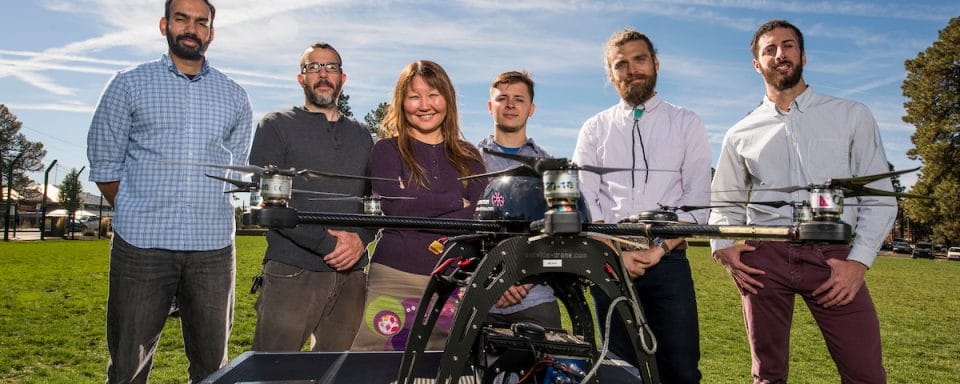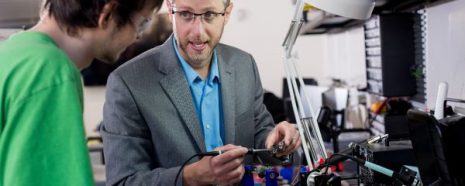By the numbers
1217
Undergraduate Students207
Graduate Students#13
Ranked Informatics B.S53%
International & Minority Students$31 M
Active Research GrantsSchool of Informatics, Computing, and Cyber Systems
The School of Informatics, Computing, and Cyber Systems (SICCS) integrates a range of educational programs and interdisciplinary research. Our programs integrate computational and data sciences with engineering, natural and social sciences, arts, and business.
Our Degrees
We offer undergraduate and graduate programs in Informatics, Electrical Engineering, and Computer Science. Our students are involved in a broad range of research and applied experiences. Explore our programs below!
Research & Emphasis Areas
Our school’s faculty, students, and staff bring interdisciplinary expertise to bear on applied and basic research problems in several emphasis areas, and in partnership with a variety of local and global partners. SICCS currently emphasizes five major areas of research.
-
Research Emphasis Areas Tab Open
-
Highlighted Research Projects Tab Closed
-
Highlighted Publications Tab Closed
-
Research Partners Tab Closed
Highlighted Publications Accordion Closed
- Dubayah, R., Blair, J.B., Goetz, S., Fatoyinbo, L., Hansen, M., Healey, S., Hofton, M., Hurtt, G., Kellner, J., Luthcke, S., Armston, J., Tang, H., Duncanson, L., Hancock, S., Jantz, P., Marselis, S., Patterson, P., Qi, W., Silva, C. (2020). The Global Ecosystem Dynamics Investigation: High-resolution laser ranging of the Earth’s forests and topography. Science of Remote Sensing 100002.
- Brancalion, P. H. S., Niamir, A., Broadbent, E., Crouzeilles, R., Barros, F. S. M., Almeyda Zambrano, A. M., Baccini, A., Aronson, J., Goetz, S.J., Reid, J. L., Strassburg, B. N., Wilson, S., Chazdon, R. L. (2019). Global restoration opportunities in tropical rainforest landscapes. Science Advances, 5(7), eaav3223.
- Walker, X. J., Baltzer, J. L., Cumming, S. G., Day, N. J., Ebert, C., Goetz, S.J., Johnstone, J. F., Potter, S., Rogers, B. M., Schuur, E. A. G., Turetsky, M. R., Mack, M. C. (2019). Increasing wildfires threaten historic carbon sink of boreal forest soils. Nature, 572(7770), 520–523.
- Anderegg, W.R.L., Trugman, A.T., Badgley, G., Anderson, C.M., Bartuska, A., Ciais, P., Cullenward, D., Field, C.B., Freeman, J., Goetz, S.J., Hicke, J.A., Huntzinger, D., Jackson, R.B., Nickerson, J., Pacala, S., Randerson, J.T. (2020). Climate-driven risks to the climate mitigation potential of forests, Science 368 (6497)
- Walker, X. J., Baltzer, J. L., Cumming, S. G., Day, N. J., Ebert, C., Goetz, S.J., Johnstone, J. F., Potter, S., Rogers, B. M., Schuur, E. A. G., Turetsky, M. R., Mack, M. C. (2019). Increasing wildfires threaten historic carbon sink of boreal forest soils. Nature, 572(7770), 520–523.
- Basu S., S.J. Lehman, J.B. Miller, A.E. Andrews, C. Sweeney, K.R. Gurney, X. Xu, J. Southon, P. Tans (2020) Estimating US Fossil Fuel CO2 Emissions from Measurements of 14C in Atmospheric CO2, Proceedings of the National Academy of Sciences, June 16, 2020 117 (24) 13300-13307; first published June 1, 2020
- Gurney, K., Shepson, P., “Opinion: The power and promise of improved climate data infrastructure“.
- Gomez, M., A. Mejia, B.L. Ruddell, and R.R. Rushforth (2021), Supply chain diversity buffers cities against food shocks, Nature, V.595
- Gurney, K.R., Liang, J., Roest, G. et al. Under-reporting of greenhouse gas emissions in U.S. cities. Nat Commun 12, 553 (2021).
- Myers Smith, I.H., Kerby, J.T., ET.AL (2020)”Complexity revealed in the greening of the Arctic.” Nature Climate Change, 10(2), 106-117.
- Berner, L., Massey, R., Jantz, P., Forbes, B. C., Macias Fauria, M., Myers-Smith, I., … & Burns, P. (2020). “Summer warming explains widespread but not uniform greening in the Arctic tundra biome“. Nature Communications.
- O., Watson, J.E.M., Jantz, P., Virnig, A.L.S., Barnett, K., Pillay, R., Atkinson, S., Supples, C., Rodríguez-Buritica, S., Armenteras, D. (2020). “A policy-driven framework for conserving the best of Earth’s remaining moist tropical forests“. Nature Ecology and Evolution Evolution, early edition online.
- William R. L. Anderegg, Anna T. Trugman, Scott J. Goetz, et al. “Climate-driven risks to the climate mitigation potential of forests“. Science 368.6497 (2020).
- Enquist, B. J., Abraham, A. J., Harfoot, M. B., Malhi, Y., & Doughty, C. E. (2020). The megabiota are disproportionately important for biosphere functioning. Nature communications, 11(1), 1-11.
- Richter, B.D., et al. Water scarcity and fish imperilment driven by beef production. Nat Sustain (2020).
- Schmitz, Oswald J., et al. “Animals and the zoogeochemistry of the carbon cycle.” Science 362.6419 (2018): eaar3213.
- Ogle, Kiona. “Hyperactive soil microbes might weaken the terrestrial carbon sink.” Nature (2018): 32.
- Richardson, Andrew D., et al. “Ecosystem warming extends vegetation activity but heightens vulnerability to cold temperatures.” Nature 560.7718 (2018): 368.
- Buermann, Wolfgang, et al. “Widespread seasonal compensation effects of spring warming on northern plant productivity.” Nature 562.7725 (2018): 110.
- McManamay, Ryan A., et al. “US cities can manage national hydrology and biodiversity using local infrastructure policy.” Proceedings of the National Academy of Sciences 114.36 (2017): 9581-9586.
- Lu, Xiankai, et al.“Plant acclimation to long-term high nitrogen deposition in an N-rich tropical forest.” Proceedings of the National Academy of Sciences 115.20 (2018): 5187-5192.
Research Partners Accordion Closed
Our research is supported through collaborations with other university entities such as:
- Pathogen and Microbiome Institute
- Center for Ecosystem Science and Society
- School of Earth Sciences and Environmental Sustainability
- Merriam-Powell Center for Environmental Research
- Department of Physics and Applied Materials Science
Our regional research partners include:
News
Take a look at what’s currently happening in the world of Informatics, Computing, and Cyber Systems.
Congratulations Bianca Trinkenreich for receiving the 2024 ACM SIGSOFT Outstanding Dissertation Award for the work she performed during her PhD here at SICCS!
Disease ecologist awarded $3.5 million to build revolutionary epidemiological platform
Congratulations John Hardy for receiving the NAU/NASA space grant!
Congratulations to Jasmine Mendez and Adam Wilson on receiving the Hooper Undergraduate Research Award(HURA)
NAU scientists studying how climate change is impacting caribou populations


